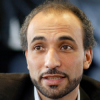Tariq Ramadan

Tariq Ramadan
Tariq Ramadanis a Swiss academic, philosopher and writer. He is the professor of Contemporary Islamic Studies in the Faculty of Oriental Studies at St Antony's College, Oxford and also teaches at the Oxford Faculty of Theology. He is a visiting professor at the Faculty of Islamic Studies, the Université Mundiapolisand several other universities around world. He is also a senior research fellow at Doshisha University. He is the director of the Research Centre of Islamic Legislation and Ethics, based in...
NationalitySwiss
ProfessionWriter
Date of Birth26 August 1962
CountrySwitzerland
It is like using a smoke screen, the same thing for an individual. The topic here is Islam. If French politicians are no longer talking about Islam, they know they will have to talk about something else, which brings the spotlight on their inefficiency. They will have to talk about domestic social and economic issues and they will have to justify their foreign policy, which is obviously something they need to avoid at all costs.
We have talked about revoking French citizenship for some individuals. Therefore, I have decided to apply for citizenship, which in a way points out the contradictions of this bill that states the forfeiture of French citizenship exclusively to individuals holding dual nationalities. Through this application, I put myself in the midst of the French political debate and discredit everything that might be said against me about this matter.
You cannot limit the debate to being solely in favour or against. It should be more complex. When you condemn, you need to understand what led to it. In general, if it is our responsibility to condemn terrorist actions after they had happened, we have an even greater responsibility beforehand to make sure they won't happen.
I don't think we should take the emotional reactions of a few people as more representative than those of the millions of people who took to the street in a non-violent way against dictators.
It is important that the Muslim leaders, scholars, and intellectuals are much more vocal and explain what Islam is.
Greek philosophy departs from the assumption that we can understand the world autonomously using our rational faculties. Islam is not saying this.
We have to be very cautious not to accept the scam of polarization we see in the media. It is not in fact between secularists and Islamists, it is a battle within the Islamic reference.
Life is not black and white when it comes to perception.
I am talking about anything that is a provocation - ignore it. When something falls under freedom of expression, you can read it and take a critical distance.
I don't like this vision that Turkey is successful because it is as successful as the western powers in economic terms. But I do think they are trying to find a new space in the multi-polar world, and this is what I am advocating. I don't think that Muslims have an alternative model.
The problem with what we call the 'Arab spring' is that these are very nationalistic experiences. Tunisians are concerned with Tunisia, Egyptians concerned with Egypt and so on.
I think what we are seeing is a vicious circle: by covering the controversies and the conflicting realities, it creates a much distorted perception of Islam and Muslims. When a minority is being taken as a majority, it creates a wrong image.
The media is putting a lot of emphasis on the few people that are destroying, while it won't report on the silent majority of people who are constructing, building and trying to find their way.
In fact all the Islamists, that is the reformists not the Salafis, now they all say that they want a civil state, a civil state with Islamic reference points. They are not talking about an Islamic state, or sharia in the way this was once understood in the fight against the colonisers, or just afterwards in the 70's, 80's and 90's.